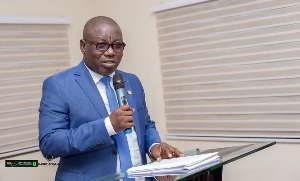The Ministry of Communications and the National Cyber Security Centre on Wednesday organised a day's intensive training on cyber-crime prevention and protection for more than 400 Senior High School (SHS) students in the Cape Coast Metropolis.
The training was part of the national cyber security awareness campaign launched early this month by the Government, to ensure adequate protection of Ghanaian children, institutions and government to shield themselves from cyber threats and attacks.
The nationwide training exercise had been done in the three regions of the north, Brong Ahafo, Ashanti and the Western Regions.
Addressing students of the Ghana National College, Dr Nana Kofi Annan, Child-Online Consultant, said the training had become necessary following increasing trends in cyber crime mostly involving children and the youth.
It has become prudent that children were educated on their vulnerability on the cyber space to ensure cyber protection, child online security measures and insulate risks to reduce attacks associated with it, he said.
Dr Annan stated that the advent of social media platforms like Facebook, twitter and Instagram among others exposed unsuspecting persons mostly children to indecent acts like pornography and fake business deals.
Cybercrime had become more complex following continuous evolution of new and sophisticated technologies and urged all to adhere to cyber security safety tips to prevent attacks associated with it.
He urged the students to impart the knowledge they had acquired to others, adding that "many people who fall victims to cyber threats and attacks have little or no knowledge about the dangers as well as the essence of cyber security".
They should avoid predators by using standardised passwords that contained both numbers and alphabets and desist from sharing personal information with people they barely knew or felt uncomfortable when asked to share nude pictures among others.
Additionally, they must restrain themselves from being reactive on social media platforms and avoid sharing codes with family and friends.
He warned that one could be hacked, pulled, have sensitive files or information destroyed, blackmailed, defrauded or even be kidnapped via the internet if not used with caution and circumspection.
The students were charged to exhibit proper etiquette to fully make use of the cyber space for learning, entertainment, research, socialisation and certified information sharing.
Ms Ruth Pappoe, Digital Communication Officer (DCO) of the United Nation Children Education Fund (UNICEF), underlined the need for all to work together to uplift the rights and privileges of all children.
To achieve that, she urged the students to accept UNICEF's 'U-report' - a free SMS-based tool for community participation, designed to address issues that Ghanaians care about.
That included teenage pregnancy, sexual reproductive rights, open defecation, education, youth unemployment, HIV/AIDS, disease outbreaks, child marriage, violence towards children, cyber bullying, child online protection among others.
The SMS polls and alerts were sent out to U-reporters and real-time response information was collected as results and ideas were shared back with the community and government to guide policy making and implementations.
General News of Thursday, 18 October 2018
Source: ghananewsagency.org













